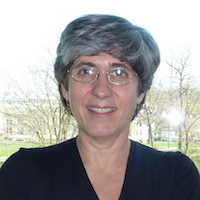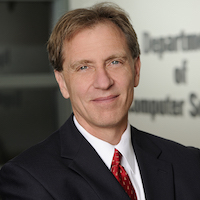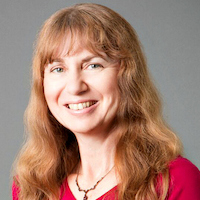Artificial Intelligence Task Force
Chairs: Manuela Veloso and Greg Hager
 Manuela Veloso
Manuela Veloso
Carnegie Mellon University
Manuela Veloso Website
 Manuela M. Veloso is the Herbert A. Simon University Professor in the School of Computer Science at Carnegie Mellon University. She is the Head of the Machine Learning Department. She is a Past President of AAAI (Association for the Advancement of Artificial Intelligence), and the co-founder and a Past President of the RoboCup Federation. She is a fellow of ACM, IEEE, AAAS, and AAAI.
Manuela M. Veloso is the Herbert A. Simon University Professor in the School of Computer Science at Carnegie Mellon University. She is the Head of the Machine Learning Department. She is a Past President of AAAI (Association for the Advancement of Artificial Intelligence), and the co-founder and a Past President of the RoboCup Federation. She is a fellow of ACM, IEEE, AAAS, and AAAI.
Manuela researches in artificial intelligence, with a focus in robotics and machine learning. Her long-term research goal is the effective construction of autonomous agents where cognition, perception, and action are combined to address planning, execution, and learning tasks. Her vision is that multiple intelligent AI agents, coexisting with humans, with different sets of complementary capabilities will provide a seamless synergy of intelligence. With her students, she has contributed a variety of autonomous robots. Her robot soccer teams have been RoboCup world champions multiple times, and the CoBot mobile service robots have autonomously navigated for more than 1,000km in multi-floor university buildings. She founded and directs the CORAL research laboratory, for the study of agents that Collaborate, Observe, Reason, Act, and Learn. See www.cs.cmu.edu/~mmv for details.
 Gregory Hager
Gregory Hager
Johns Hopkins University
Gregory Hager Website
 Gregory D. Hager is a Professor and former Chair of Computer Science at Johns Hopkins University. He received his BA from Luther College and his MSE and PhD from the University of Pennsylvania in 1986 and 1988, respectively. After a year as a Fulbright scholar at the University of Karlsruhe, he joined the faculty of Yale University in 1990. He moved to Johns Hopkins in 1999. His research interests include image-guided robotics, human-machine collaboration, and medical applications of image analysis and robotics. He has served as the Deputy Director of the NSF Engineering Research Center for Computer Integrated Surgical Systems and Technology, he serves on board of the International Federation of Robotics Research, and he is a fellow of the IEEE for his contributions in vision-based robotics. He serves as Chair of the Computing Community Consortium.
Gregory D. Hager is a Professor and former Chair of Computer Science at Johns Hopkins University. He received his BA from Luther College and his MSE and PhD from the University of Pennsylvania in 1986 and 1988, respectively. After a year as a Fulbright scholar at the University of Karlsruhe, he joined the faculty of Yale University in 1990. He moved to Johns Hopkins in 1999. His research interests include image-guided robotics, human-machine collaboration, and medical applications of image analysis and robotics. He has served as the Deputy Director of the NSF Engineering Research Center for Computer Integrated Surgical Systems and Technology, he serves on board of the International Federation of Robotics Research, and he is a fellow of the IEEE for his contributions in vision-based robotics. He serves as Chair of the Computing Community Consortium.
Current Members:
 Eric Horvitz
Eric Horvitz
Microsoft Research
Eric Horvitz Website
 Eric Horvitz is a Technical Fellow at Microsoft Research. He is pursuing research on principles of machine intelligence and on leveraging the complementarities of human and machine reasoning. He is passionate about harnessing the latest computing advances to provide valuable services. He has long been curious about the computational foundations of intelligence: How do our minds work? What computational principles and architectures underly thinking and intelligent behavior? A key focus of his work has been on opportunities to leverage the complementarities of human and machine intelligence. Related interests include machine learning and decision making for crowdsourcing and human computation, information triage and alerting that takes human attention into consideration, spanning work on notification systems, surprise modeling, multitasking, and psychological studies of interruption and recovery.
Eric Horvitz is a Technical Fellow at Microsoft Research. He is pursuing research on principles of machine intelligence and on leveraging the complementarities of human and machine reasoning. He is passionate about harnessing the latest computing advances to provide valuable services. He has long been curious about the computational foundations of intelligence: How do our minds work? What computational principles and architectures underly thinking and intelligent behavior? A key focus of his work has been on opportunities to leverage the complementarities of human and machine intelligence. Related interests include machine learning and decision making for crowdsourcing and human computation, information triage and alerting that takes human attention into consideration, spanning work on notification systems, surprise modeling, multitasking, and psychological studies of interruption and recovery.
Maja Matarić
University of Southern California
Maja Matarić Website
 Maja Matarić is professor and Chan Soon-Shiong chair in Computer Science Department, Neuroscience Program, and the Department of Pediatrics at the University of Southern California, founding director of the USC Robotics and Autonomous Systems Center (RASC), co-director of the USC Robotics Research Lab and Vice Dean for Research in the USC Viterbi School of Engineering. She received her PhD in Computer Science and Artificial Intelligence from MIT in 1994, MS in Computer Science from MIT in 1990, and BS in Computer Science from the University of Kansas in 1987. Prof. Matarić is the author of a popular introductory robotics textbook, “The Robotics Primer” (MIT Press 2007), an associate editor of three major journals and has published extensively. She serves or has recently served on a number of advisory boards, including the National Science Foundation Computing and Information Sciences and Engineering (CISE) Division Advisory Committee, and the Willow Garage and Evolution Robotics Scientific Advisory Boards. Prof. Matarić is actively involved in K-12 educational outreach, having obtained federal and corporate grants to develop free open-source curricular materials for elementary and middle-school robotics courses in order to engage student interest in science, technology, engineering, and math (STEM) topics. This is Maja’s first year on the CCC Council.
Maja Matarić is professor and Chan Soon-Shiong chair in Computer Science Department, Neuroscience Program, and the Department of Pediatrics at the University of Southern California, founding director of the USC Robotics and Autonomous Systems Center (RASC), co-director of the USC Robotics Research Lab and Vice Dean for Research in the USC Viterbi School of Engineering. She received her PhD in Computer Science and Artificial Intelligence from MIT in 1994, MS in Computer Science from MIT in 1990, and BS in Computer Science from the University of Kansas in 1987. Prof. Matarić is the author of a popular introductory robotics textbook, “The Robotics Primer” (MIT Press 2007), an associate editor of three major journals and has published extensively. She serves or has recently served on a number of advisory boards, including the National Science Foundation Computing and Information Sciences and Engineering (CISE) Division Advisory Committee, and the Willow Garage and Evolution Robotics Scientific Advisory Boards. Prof. Matarić is actively involved in K-12 educational outreach, having obtained federal and corporate grants to develop free open-source curricular materials for elementary and middle-school robotics courses in order to engage student interest in science, technology, engineering, and math (STEM) topics. This is Maja’s first year on the CCC Council.
Dramatic advances in the power and practicality of Artificial Intelligence (AI) have broad us to a point where the potential impact of AI on society and economy are far-reaching and profound. Yet, we are just at beginnings of understanding the possibilities for AI-related technologies, and at the same time are struggling to understand and advance beyond the substantial limitations of current state-of-the art systems.
The role of this task force was to provide a mechanism for articulating both the state of the art and technical limitations of AI, to help develop forward-looking research agendas for the field, and to better understand the potential of AI to provide tremendous social good in the future, including but not limited to urban computing, health, environmental sustainability, and public welfare. The AI task force operated from operated from 2016-2018 and is succeeded by the AI working group.
CCC materials produced and curated for this task force include:
- AI for Social Good workshop report
- Tom Kalil’s AI for Good paper (draft)
- Videos from the AAAI Symposium on AI for Social Good
- Advances in Artificial Intelligence Require Progress Across all of Computer Science white paper
- Videos from the Artificial Intelligence for Social Good workshop
- Next Generation Robotics white paper
- Robotics white paper
- CCC Blog post, “Thoughts from White House Frontier’s Conference and the National AI R&D Strategic Plan“
- CCC Blog post, “White House OSTP Report- Preparing for the Future of Artificial Intelligence“
- CCC Blog post, “World’s Largest Technology Companies Create Historic Partnership on AI“
- CCC Blog post, “One Hundred Year Study on Artificial Intelligence“
- CCC Blog post, “Artificial Intelligence for Social Good“
Artificial Intelligence Videos:
The video playlist below features the videos from AI and Amplifying Human Abilities Plenary and Panel at the 2017 Computing Research Symposium. Details about the speakers are below.
Plenary: Thad Starner, Georgia Tech/Google’s Glass – Augmenting Intellect through Wearables and Artificial Intelligence
Moderator: Beth Mynatt, CCC Chair/Georgia Tech
Panelists:
- Brenna Argall, Northwestern University – Human Autonomy through Robotics Autonomy
- Jeffrey P. Bingham, Carnegie Mellon University – Deep Integration of Human and Machine Intelligence for Accessibility
- Suchi Saria, Johns Hopkins University – Humans and Machine Working Together to Spot Diseases Faster
- Cliff Young, Google Brain Team – Deep Learning, Special-Purpose Hardware, and Some Hard Problems
The following playlist features videos from the AAAI Symposium for AI for Social Good.
The following playlist features videos from the workshop on Artificial Intelligence for Social Good.
Science and Policy Materials on AI:
NITRD – In October 2016, the Networking and Information Technology Research and Development (NITRD) Program released the The National Artificial Intelligence Research and Development Strategic Plan which identifies the strategies and priorities for Federally-funded AI research.
OSTP – In October 2016,the White House Office of Science and Technology Policy (OSTP) published the Preparing for the Future of Artificial Intelligence report, which “surveys the current state of AI, its existing and potential applications, and the questions that are raised for society and public policy by progress in AI. The report also makes recommendations for specific further actions by Federal agencies and other actors.”
White House OSTP Request for Information (RFI) for AI – In June 2016, OSTP announced a new Request for Information (RFI) on Artificial Intelligence (AI), to solicit feedback on how the United States can best prepare for the future of AI. According to the OSTP Blog, they “received 161 responses from a range of stakeholders, including individuals, academics and researchers, non-profit organizations, and industry.” All of the responses are now public and can be found here. The CCC’s response can be found here.
AI-related Events:
OSTP Workshop Series – In May, 2016 OSTP announced four workshops (later a fifth was added) surrounding the future of artificial intelligence to explore the opportunities and challenges that AI presents.
- Artificial Intelligence for Social Good – The CCC co-hosted the second OSTP AI Workshop, Artificial Intelligence for Social Good, with OSTP and AAAI. In this workshop, we discussed the successful deployments and the potential use of AI in various topics that are essential for social good, including but not limited to urban computing, health, environmental sustainability, and public welfare. You can learn more about the workshop here.
- Artificial Intelligence: Law and Policy – The first workshop in the series was co-hosted by the University of Washington School of Law, the White House, and UW’s Tech Policy Lab, “the event places leading artificial intelligence experts from academia and industry in conversation with government officials interested in developing a wise and effective policy framework for this increasingly important technology.”
- The Future of Artificial Intelligence – The third workshop, co-hosted by Stanford University and OSTP, featured “leading artificial intelligence (AI) researchers will discuss the most impactful research topics in AI and highlight the challenges and potentials of artificial intelligence.”
- Workshop on Safety and Control for Artificial Intelligence – The fourth workshop was co-hosted by Carnegie Mellon University and OSTP and included “keynote talks and panel discussions that explore the potential future of AI and AI applications, the emerging technical means for constructing safe and secure systems, how safety might be assured, and how we can make progress on the challenges of safety and control for AI.”
- The Social and Economic Implications of Artificial Intelligence Technologies in the Near-Term – The fifth workshop in the series was co-hosted by the NYU Information Law Institute and the White House generated “a foundational discussion about the role of AI in social and economic systems.”
One Hundred Year Study on AI – “The One Hundred Year Study on Artificial Intelligence, or AI100, is a 100-year effort to study and anticipate how the effects of artificial intelligence will ripple through every aspect of how people work, live and play” and is the brainchild of task force co-chair Eric Horvitz. Learn more about the One Hundred Year Study here and view the 2016 report here.
AAAI Symposium on AI for Social Good – In 2016, the CCC co-sponsored a workshop on Artificial Intelligence for Social Good with AAAI and OSTP. In order to further the discussion of the benefits of AI to society, the CCC will co-sponsor the AAAI 2017 Spring Symposium on AI for Social Good at Stanford University, March 27-29. This symposium will focus on the promise of AI across multiple sectors of society. Learn more about the Symposium here.
Symposium on Accelerating Science: A Grand Challenge for AI – In November 2016, the CCC co-sponsored a AAAI Symposium that brought together researchers in relevant areas of artificial intelligence (e.g., machine learning, causal inference, knowledge representation and inference, planning, decision making, human computer interaction, distributed problem solving, natural language processing, multi-agent systems, semantic web, information integration, scientific workflows), high performance data and computing infrastructures and services, and selected application areas (e.g., life sciences, learning sciences, health sciences, social sciences, food energy and water nexus) to discuss progress on, and articulate a research agenda aimed at addressing, the AI grand challenge of accelerating science. A workshop report is in progress.
Other Resources:
Partnership on AI – In September, 2016 Amazon, DeepMind/Google, Facebook, IBM, and Microsoft “announced that they will create a non-profit organization that will work to advance public understanding of artificial intelligence technologies (AI) and formulate best practices on the challenges and opportunities within the field. Academics, non-profits, and specialists in policy and ethics will be invited to join the Board of the organization, named the Partnership on Artificial Intelligence to Benefit People and Society (Partnership on AI).” You can read the full press release here.
2016 Robotics Roadmap – In 2009, the CCC released A Roadmap for US Robotics, From Internet to Robotics (Robotics Roadmap). The Robotics Roadmap explored the capacity of robotics to act as a key economic enabler, specifically in the areas of manufacturing, healthcare, and in the service industry, 5, 10, and 15 years into the future and was influential in developing 2011’s National Robotics Initiative (NRI). An updated version of the Robotics Roadmap was released in November, 2016 and it expands on the topics discussed in the 2009 roadmap as well as addressing the areas of public safety, earth science, and workforce develop. You can read the full 2016 roadmap here.
Press Articles and Thought Pieces:
The Terminator and the Washing Machine, New York Times
Three Ways Artificial Intelligence is Helping to Save the World, Erin Biba, Freelance Science Journalist
The Terminator and the Washing Machine, New York Times Video on the limitations of AI
Machine Learning and the Profession of Medicine, The Journal of the American Medical Association
Protecting Humans and Jobs From Robots Is 5 Tech Giants’ Goal, New York Times
How the Scary Potential of AI Brought Tech Competitors Together, Mashable
Tech Giants’ Partnership To Explore Ethics, Societal Impacts of AI, Xconomy






